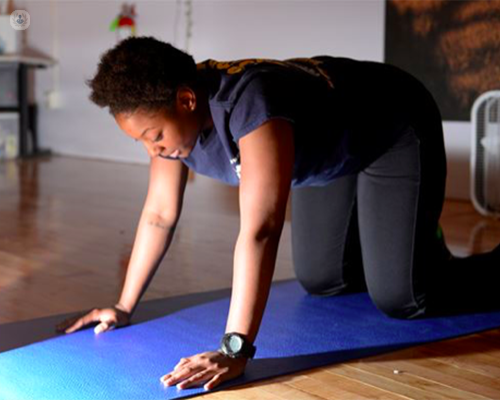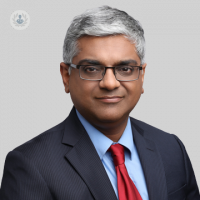How to reduce back pain
Written by:Back pain is one of the most common day-to-day health complaints, suffered by most of the UK population at one point or another. Most of the time, back pain gets better over time, and it’s nothing to particularly worry about. That said, if you have to cope with back pain that lasts a long time, it can be difficult to deal with, and cause significant discomfort.
Dr Kaushik Sanyal, a leading consultant rheumatologist and physician based in Worthing, Hove and London, discusses how to manage it in this informative article.

How can I relieve back pain at home?
Back pain usually lasts a few days or weeks, and there are ways to help recovery along and reduce the pain. In order to relieve short-term back pain, you can try some of the following tips.
Exercise for back pain
This can be in the form of particular stretches and exercises, or perhaps attending yoga or Pilates classes. Swimming and walking can also be beneficial – nothing too high impact.
As well as exercising, it’s important to be active throughout the day, instead of allowing the pain to keep you either indoors and resting. Going through your daily activities as normal is one of the best things you can do to help, as being inactive for a long time is likely to make the pain worse.
Apply hot and cold treatment
Apply hot or cold packs, or a hot water bottle, depending on which you find relieves the pain more effectively. You can even wrap ice or frozen vegetables in a tea towel or cloth if you can’t get cold packs, or want instant relief while at home.
Use pain killers
Try over-the-counter anti-inflammatory painkillers as short-term relief from back pain.
Keep positive
Stay positive and optimistic as much as is possible! You’re more likely to recover quicker if you try steer yourself away from a negative outlook.
When should I see a doctor about back pain?
If your back pain lasts longer than a few weeks, or months, you may need to consider visiting your GP, especially if the pain stops you continuing daily activities, or you’re finding it difficult to manage. If the pain gets worse or more frequent, it’s also a reason to visit a healthcare professional. Your GP will assess you, and refer you on to a specialist if they feel it is necessary.
What are the causes of back pain?
Back pain can have various causes, including trauma or injury, or a specific medical condition. More common conditions causing back pain include:
- A slipped or herniated disc in the spine. Discs in the spine work together to provide stability in the back, and allow a wide range of movement. Over time these discs may become injured due to pressure and stress, age, or trauma. This can cause lower back pain, leg pain, or numbness and weakness.
- Sciatica, which occurs when the nerve running down from the pelvis to the feet becomes irritated. Sciatica usually affects one side of the body, and can also cause numbness in the leg.
- A sprain or strain in the back, which can also limit movement
- Compression on nerves in the spine
Back pain may also have no obvious cause, in which it is identified as ‘non-specific back pain’. It's treated differently depending on if it has a specific cause, or if it is non-specific.
When does back pain become an emergency?
If you experience any of the following symptoms combined with back pain, it is best to see a doctor as soon as possible:
- Swelling or deformity in the back
- Weight loss with no particular reason
- Lack of control over bladder or bowels - incontinence
- Difficulties when urinating
- Pain in the chest
- Numbness or a tingling sensation in the buttocks or genitals
- High temperature (fever above 38°C)
If you experience back pain after having been in an accident or after falling, for example, you should contact your healthcare provider, as it could be an indication of a more serious injury.
How is back pain treated?
Treatment for back pain depends on the type of back pain or condition which the patient is suffering from. Your GP may recommend particular methods of treatment, or they may refer you on to a specialist who can deal with specific conditions and different kinds of pain.
Many methods of treatment include exercise and physiotherapy, where the patient is taught how to practice exercises which will hopefully improve their condition by improving muscle strength and tone. Posture can also be improved on, which in turn can help reduce pain.
With manual therapy or physiotherapy, massages or manipulation of a particular area in the spine may be recommended. Make sure to visit a healthcare professional such as a physiotherapist or chiropractor to have this treatment carried out.
Some patients may need emotional or psychological support to help them cope with the pain. It can be a struggle to deal with pain that doesn’t go away over a long period of time, and cognitive therapy may be a solution which gives the patient the support they need.
With some conditions, surgery may be a solution, but this is only recommended for particular cases when the doctor or healthcare professional has evaluated all the symptoms and assessed the patient’s condition.
If you experience back pain in your day-to-day life, read more about how to make small lifestyle changes and other tips which can help you to cope with the pain and manage it at home in this informative article.
Arrange an appointment with Dr Sanyal in order to assess your back pain by visiting his Top Doctors profile.



